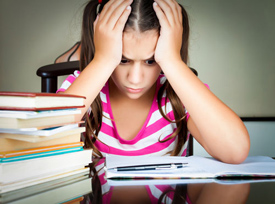
Winter, Stress and Children
Are you tired of winter ? Feeling stressed ? You’re not alone !

Kids can suffer from the winter blues too. Even very young children experience stress. But kids don’t have the coping skills we’ve learned as adults.
Stress makes it more difficult for children to concentrate and to get along with others, which can lead to problems at school or day care. If stress is interfering with a child’s ability to focus or think, he or she may become anxious or afraid, using up energy on worrying that should be going into learning and playing.
Stress can also affect kids’ health. Research has found stress is a factor in 90% of illnesses.
Kid Stress
Beyond being cooped up indoors in stormy winter weather, which can be stressful for everyone in the family, what else can cause kids stress? Change is a big one, as it is for adults – moving to a different neighborhood, starting school or transferring to a new school, parents that are separating or newly divorced.

The death of a grandparent or a beloved pet can be more significant to a child that it might first appear, and serious illness or disability impacts all the members of a family.
Bullying is a big concern today too. Kids who are teased or bullied feel lonely and unloved.
How to Help

Children can learn simple, age-appropriate strategies to cope with stress, and as those skills develop, they feel more competent and resilient. Even if they might not be conscious of their increased confidence at first, they will notice it’s easier to relax, and to solve problems.
If you see signs of stress in a child, the most important thing you can do as a parent or grandparent is to spend time with them. Listen carefully when they talk to you, and try to understand and acknowledge how they’re feeling. Show them you love them with words and hugs, and do things with them – it will help them feel like they “belong” in the family.
 Exercise is a great way to burn off stress, and wonderful “healthy” medicine if a child is having difficulty sleeping too. Make exercise a regular part of your family life. Get outside – go sledding, skiing, skating or snowshoeing.
Exercise is a great way to burn off stress, and wonderful “healthy” medicine if a child is having difficulty sleeping too. Make exercise a regular part of your family life. Get outside – go sledding, skiing, skating or snowshoeing. 
Take a hike… or go swimming. Getting to swim in a steamy pool in the middle of winter is a real treat for a child, and a lot of fun for a family.
Participating in recreational activities together creates perfect opportunities to talk to kids, especially adolescents and teens, in a non-judgmental, non-threatening way. Share ideas, and talk about how you feel about things.
Communication is Key
If you think your kids are feeling stressed, ask them. If you see they’re upset, help them to calm down so they can think more clearly – a few deep breaths usually helps. Ask them how they feel, and why they think they feel that way.

Next, ask them how big the problem is, and listen carefully to what they say. Help them to consider different options, and let them choose what they want to do next, and what – if anything – they’d like you to do.
Give it a bit of time, and remember to follow up by asking how things are going, and if their choices are helping.
Tips for a Less Stressful Home

– Healthy food is important, especially a good breakfast.
– Allowing plenty of time to get ready, especially in the morning. Hurrying, and the tension that goes with it , are a terrible way to start a child’s day.
– Consistent homework and bedtime routines are helpful. Structure and learning self-discipline build feelings of security and responsibility in kids. 
Predictability, especially at bedtime, helps kids relax, and getting plenty of sleep is a very important stress-buster.
Finally – as an adult – learning to manage your own stress will help your children as much as it helps you. Not only will it help your household run more smoothly, it will make solving problems easier, and give your kids a great example of the behaviors you’d like to encourage in them.
So, the next time a glass of milk flies off the table onto the floor… or they can’t find both of their boots… or the tears arrive for no apparent reason… take a deep breath, and remember stress is really just excitement wearing a worry wig!
(That’s true, actually. Well, not the “worry wig” part – at least, not literally. But research has found the physical feelings we experience from stress and anxiety – butterflies in the stomach, tense muscles, faster breathing and heartbeat, thoughts racing – are exactly the same feelings we get from excitement and celebration. The difference depends entirely on how we frame them in our minds, as bad, or good. Put another way – and this can be helpful to share with kids – feeling “scared” is no different than feeling “excited”, it just depends on whether you think the outcome will be bad or good…. so think positive!)
Sources: Canadian Mental Health Association & The Psychology Foundation of Canada. Photo Credits: blog.teamsnap.com, raiseyourresilience.com, littlemisswife.com, kids.lovetoknow.com, parachutecanada.org, pixgood.com, eatenlightened.com, pixshark.com

